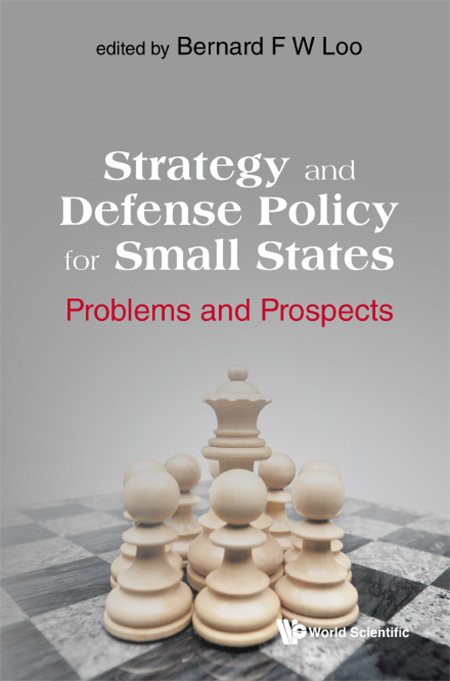For students of Strategic Studies in small countries with limited financial, human and military resources, the available literature on Strategic Studies, in particular texts that seek to explain the key concepts and components of Strategic Studies, can be very alien in its focus to the strategic conditions and issues that these countries face.
This book contains a collection of essays that seeks to discuss key concepts in Strategic Studies, as well as contemporary challenges in strategy and defence policy, from the perspective of small states. It is based on the idea — derived from the German philosopher of war, Carl von Clausewitz — that there is a distinction between logic and grammar: while the field of Strategic Studies contains a number of key concepts (such as geopolitics and geostrategy, strategic culture, arms dynamics and the phenomenon of military modernization) that are universal in logic, the grammar (that is, the specific manifestations of these concepts) in the contexts of small states is necessarily different from larger, more materially endowed, states.
Related Link(s)
Sample Chapter(s)
Preface
Introduction: Towards a Strategic Studies for Small States
Contents:
- Preface
- About the Editor
- About the Contributors
- Acknowledgments
- Introduction: Towards a Strategic Studies for Small States (Bernard F W Loo)
- Geopolitics, Geostrategy, and Defence Policy (Bernard F W Loo)
- Strategic Culture and Strategy (Bernard F W Loo)
- Singapore's Military History 2.0 (Weichong Ong)
- Military Modernization in the 21st Century Problems and Prospects for Small Military Organizations (Bernard F W Loo)
- The Changing Character of War in the 21st Century Challenges for Strategic Planning (Bernard F W Loo)
- Military Engagement in Disaster Response Policies, Interests and Issues (Alistair D B Cook)
- Peace Operations and Military Organizations Between Internationalism and Statism (Hikaru Yamashita)
- Index
Readership: This book will serve as the core text for the Master of Science (Strategic Studies) degree programme at the Rajaratnam School of International Studies, as well as the Command and Staff Course at the Goh Keng Swee Command and Staff College in the Singapore Armed Forces.
"This fine addition to the strategic studies literature translates the universal logic of strategy into small state grammar with practically-oriented themes (such as geopolitics or military modernization) reflecting particularly challenging defense policy issues for small states. Although focusing on Singapore and Southeast Asia, much of this volume's core dynamic transfers readily to other small states."
Dr Lukas Milevski
Assistant Professor, Leiden University
Author of The Evolution of Modern Grand Strategic Thought and The West's East: Contemporary Baltic Defense in Strategic Perspective
About the Author
Bernard F W Loo is Senior Fellow with the Military Studies Programme and concurrently Coordinator Master of Science (Strategic Studies) degree programme at the S. Rajaratnam School of International Studies (RSIS), Nanyang Technological University, Singapore. He is the author of Medium Powers and Accidental Wars: A Study in Conventional Strategic Stability (2005), and the editor of Military Transformation and Operations (2009). The latter title was translated into complex Chinese. His other publications have appeared in the Journal of Strategic Studies, Contemporary Southeast Asia, NIDS Security Reports, Prism, and Taiwan Defense Affairs. He has spoken on defence and strategic issues in institutions and conferences in China, Estonia, Finland, Japan, Latvia, Lithuania, New Zealand, the Philippines, South Korea, Taiwan, and the United States.
About the Contributors
Alistair D B Cook is Coordinator of the Humanitarian Assistance and Disaster Relief Programme and Senior Fellow at the Centre for Non-Traditional Security Studies (NTS Centre), S. Rajaratnam School of International Studies (RSIS), Nanyang Technological University (NTU) Singapore. His research interests focus geographically on the Asia-Pacific and Myanmar in particular, and thematically on humanitarian assistance and disaster relief (HADR), foreign policy and regional cooperation. He has taught undergraduate, graduate and professional development courses at Purdue University, University of Melbourne, Deakin University, Nanyang Technological University, Australian National University, Singapore Civil Defence Academy and SAFTI.
Weichong Ong is an Assistant Professor with the Military Studies Programme, the Institute of Defence and Strategic Studies (IDSS), the S. Rajaratnam School of International Studies (RSIS), Nanyang Technological University, Singapore. He is concurrently is an Affiliated Researcher with the Department of Leadership and Management, Swedish National Defence College and a Guest Professor at the Ecole Navale, France. He is also an alumnus of the Phillip Merrill Center for Strategic Studies Basin Harbor Workshop, SAIS, Johns Hopkins (2013). Weichong is the author of Malaysia's Defeat of Armed Communism: The Second Emergency, 1968–1989 (2014). In addition, he has published articles in Australian Defence Force Journal, Armed Forces and Society, Asia Policy, Canadian Naval Review, Defence Studies, Journal of Southeast Asian Studies, The Pacific Review, and the RUSI Journal. His op-eds and commentaries have appeared in Diplomatie, The National Interest, Defense News, The Diplomat, The Straits Times, Today, and Lianhe Zaobao.
Hikaru Yamashita is Professor in the Department of International Relations at the University of Shizuoka, Japan. Prior to joining the University in 2020 he worked for the National Institute for Defense Studies for 17 years. He is the author of Humanitarian Space and International Politics: The Creation of Safe Areas (2004), Evolving Patterns of Peacekeeping: International Cooperation at Work (2017) as well as journal articles and commentaries on peace operations, global governance, and international theory. He was a Fulbright Visiting Scholar at Columbia University's Saltzman Institute of War and Peace Studies between 2008 and 2009.




